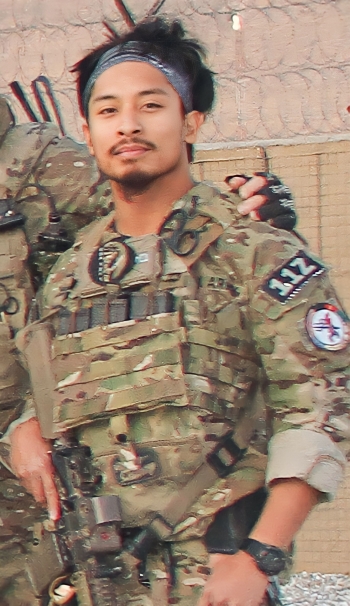College of Health Solutions alumnus named Military Medic of the Year

Jonathan Lu graduated this spring with a Doctorate of Behavioral Health from the College of Health Solutions via ASU Online. He earned his bachelor’s, master’s and doctorate all while serving as an active-duty Green Beret. Courtesy photo
By Keri Hensley and Kimberly Linn
Jonathan Lu has looked out for the health of his fellow military service members his whole career, starting with his role as a combat medic in the U.S. Army.
Driven by his commitment to improving health care for veterans and those currently serving, Lu — while still on active duty — decided to pursue a Doctorate of Behavioral Health at Arizona State University's College of Health Solutions. He notably became a Pat Tillman Scholar and focused his public health capstone project on health and behavior outcomes among U.S. Army Special Forces soldiers. The ASU Online student graduated in May.
Then just months after earning his degree, Lu was honored by the National Association of Emergency Medical Technicians as Military Medic of the Year.
“This was largely due to my efforts advocating for health and wellness of military service members, veterans and first responders using competencies gained from my doctoral studies,” Lu said. “I continue to advocate for behavioral health and seeking policy reform to improve outcomes in these uniquely vulnerable populations.”
As ASU celebrates its annual Salute to Service honoring all those who serve our nation and communities, we talked with Lu about his education and career trajectory.
Question: What made you interested in a career in health?
Answer: Witnessing the devastating effects of traumatic brain injury and PTSD on fellow soldiers as a combat medic drove my commitment to improving military health care.
Q: Why did you choose to get your Doctorate of Behavioral Health at the College of Health Solutions?
A: The College of Health Solutions offered an interdisciplinary approach that aligned with my goal to integrate behavioral health into health care systems, particularly for high-hazard vulnerable populations like military personnel.
Q: What is your current job and ultimate career goal?
A: I am the director of the Center for Health Professions at Wright State University. My ultimate career goal is to build a more equitable and just health care system that better serves all of our community. I aim to address the gaps in our health care workforce education and training pipelines.
Q: What was your favorite class or College of Health Solutions experience?
A: My favorite experience was my applied project on sleep and pain among Special Forces operators, which solidified my passion for integrating health technology in improving care for high-performance populations.
Q: Was there someone at the college who had a significant impact on your experience?
A: Dr. Lesley Manson was my chair who helped me get through IRBs (Institutional Review Board) and supported me when it got difficult. She was a constant that helped me keep my eyes on the prize of graduating.
Q: What's something you're proud to have accomplished?
A: I am proud of defying the stereotype of the “uneducated enlisted soldier.” I earned my bachelor’s, master’s and doctorate all while serving as an active-duty Green Beret.
Q: How long did you serve in the Army? Where did you serve?
A: I served for 20 years and two days — eight as a combat medic, 12 in the Special Forces as a medical sergeant and team sergeant. I served in Iraq, Afghanistan, the Philippines and other locations worldwide.
Q: What did you learn about yourself that helped you as a college student or now in your career?
A: I learned resilience, adaptability and the importance of servant leadership, all of which have shaped my career and academic journey. Even though there is the capacity for tremendous evil in the world, I still believe that it is far outweighed by the capacity of people to do good.
Q: In what ways did your service impact your choice of career?
A: My service showed me the critical need for health care solutions for small, high-performing teams in high-stress environments, driving my career in health leadership and education.
More Health and medicine
New Indigenous health dashboard offers robust database for scholars
By Nicole Greason and Kimberly Linn A team at Arizona State University’s College of Health Solutions and American Indian Studies program has created a new tool to aid researchers…
College of Health Solutions program doing its part during Salute to Service
It wasn’t always easy for Marine veteran Chuck Hale when he first returned to civilian life. But he’ll never forget the help he received from a fellow former service member.“The first vet that helped…

What makes human culture unique?
Why is human culture — the shared body of knowledge passed down across generations — so much more powerful than animal cultures?“What’s special about our species?” is a question scientists have…
